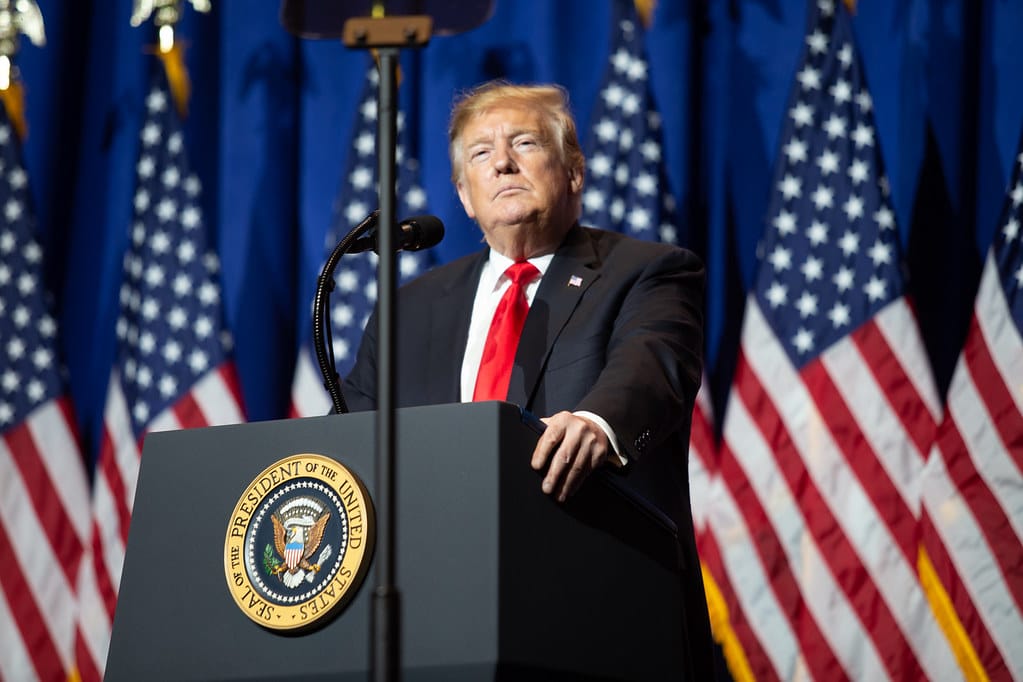Wall Street has found a new way to describe President Donald Trump’s trade policy approach, and it comes with a side of Mexican cuisine humour. The ‘TACO trade’ – an acronym for ‘Trump Always Chickens Out’ – has become the latest investment strategy making rounds among traders who have spotted a predictable pattern in the president’s tariff threats.
Financial Times columnist Robert Armstrong coined the cheeky term to describe how markets tumble when Trump announces steep tariffs, only to rally sharply when he inevitably backs down or delays implementation. The pattern has become so reliable that investors are now betting on Trump’s retreats, turning market volatility into profit opportunities.
A Pattern Emerges from Policy Reversals
No ads. No tracking.
We don’t run ads or share your data. If you value independent content and real privacy, support us by sharing.
Read More
The evidence supporting the TACO trade theory is mounting. In April, Trump unveiled his sweeping ‘Liberation Day’ tariffs, threatening rates as high as 30% or more against nearly every country on Earth. Markets plummeted in response. Just one week later, following stock market turmoil, Trump announced he would drop all tariffs to 10% for 90 days. The result was one of the biggest single-day rallies in history .
The European Union tariff saga follows an identical script. Trump called for a 50% tariff on EU goods to begin on 1 June, accusing the bloc of being ‘very difficult to deal with’. Markets fell on Friday following the announcement. By Sunday, Trump had delayed the deadline to 9 July after European Commission President Ursula von der Leyen requested an extension. Tuesday’s trading session saw stocks rally across major indices .
Even the trade war with China has followed this predictable rhythm. Trump initially ratcheted up tariffs on Beijing to 145% in April, spurring retaliation and market anxiety. A month later, he dropped them to 30% following initial trade talks.
Trump’s Defence: ‘It’s Called Negotiation’
When confronted about the TACO trade at a White House briefing, Trump’s response was swift and defensive. ‘After I did what I did, they said, “We’ll meet anytime you want”,’ Trump said of the European Union. ‘You call that chickening out? It’s called negotiation.’
The president went on to criticise the question itself as ‘nasty’ and expressed frustration with how his approach is perceived. ‘The sad thing is, now, when I make a deal with them, it’s something much more reasonable, they’ll say, “Oh, he was chicken, he was chicken”,’ Trump said. ‘That’s so unbelievable.’
Market Volatility Becomes Investment Strategy
The predictability of Trump’s tariff reversals has created what analysts describe as a new form of market strategy. Retail investors have poured more than $50 billion into equities since 8 April, according to JPMorgan data, with many specifically buying the dip on Trump’s trade war threats .
As one Wall Street analyst noted, ‘buying those stocks when they are beaten down, waiting for him to chicken out and watching those stocks rebound in value’ has become a profitable approach for those willing to stomach the initial volatility.
The CBOE Volatility Index, often called the ‘fear index’, reached around 25 in March 2025, indicating elevated market concern but remaining below crisis thresholds. UC Riverside economist Jana Grittersová explained that markets now see Trump’s concessions as temporary manoeuvres rather than resolutions, leading investors to price in the risk of retaliatory measures alongside direct tariff costs.
Economic Implications Beyond Market Games
While investors may profit from the volatility, the broader economic implications are more serious. Goldman Sachs has lowered its US growth forecast for 2025 by 0.7 percentage points to 1.7%, citing the adverse effects of tariffs and trade policy uncertainty introduced by the Trump administration.
The pattern of threats and retreats has also eroded trust in US trade policy consistency. Markets are no longer factoring in just the direct costs of tariffs but also pricing in the risk of retaliatory measures and disruptions to global supply chains.
This volatility extends beyond traditional markets, affecting everything from cryptocurrency trading to broader financial market stability. The uncertainty has created ripple effects that reach far beyond the immediate scope of trade policy.
Commerce Secretary Howard Lutnick recently told Axios that the administration expects to reach deals with ‘most’ key trading partners by summer, though he acknowledged that ‘some countries are impossible’ to negotiate with, specifically mentioning the European Union. Treasury Secretary Scott Bessent echoed this sentiment, noting that with 18 important trading partners, ‘most are negotiating in very good faith’ except for the EU.
The Future of TACO Trading
As 2025 unfolds, the effectiveness of the TACO trade strategy may face its ultimate test. The 90-day pause on reciprocal tariffs expires in early July, potentially forcing Trump’s hand on whether his threats carry genuine weight or remain purely tactical.
Market strategists warn that tariff threats should spark volatility, not panic , suggesting that while the pattern may continue, investors should remain cautious about assuming Trump will always retreat from his positions.
The current environment mirrors broader concerns about market stability and policy predictability, as investors navigate an increasingly complex landscape of geopolitical tensions and economic uncertainty.
For now, the TACO trade represents more than just clever market timing – it reflects a fundamental change in how financial markets interpret political rhetoric in an era of social media diplomacy. Whether Trump’s negotiation tactics prove effective in securing better trade deals remains to be seen. What’s certain is that investors have found a way to profit from the uncertainty, even if it comes wrapped in the unpredictability of presidential policy-making.
The broader question for businesses and investors isn’t whether Trump will continue this pattern, but whether the short-term market gains are worth the long-term costs of policy unpredictability in an increasingly complex global economic environment.
